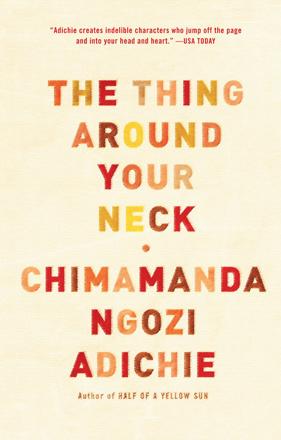You are here
Gendered encounters in Nigeria and abroad
By Sally Bland - Sep 15,2019 - Last updated at Sep 15,2019

The Thing around Your Neck
Chimamanda Ngozi Adichie
New York: Anchor Books/Random House, 2010
Pp. 218
The twelve stories in Chimamanda Ngozi Adichie’s “The Thing around Your Neck” are a virtual kaleidoscope reflecting the contemporary reality of Nigerians, with occasional reversions to the past. Half the stories are firmly grounded in Nigeria, while the other half unfold in the United States. It is telling that almost no story is without reference to the US, showing what an important immigration destination it has been, especially for educated, upwardly mobile Nigerians.
There is nothing generic or predictable in Adichie’s animated prose which literally sparkles with significant details that pile up to point to big, overarching issues, from government corruption and police brutality, to false prejudice and pretentiousness. Every character is individually drawn, every scene is very specific, as the stories reveal what separates people and what unites them. Adichie’s adeptness at portraying the interaction between her characters is the key to the stories’ fascination and impact. Sometimes, a chance encounter opens a whole new horizon. Unlikely friendships provide succour to the hurt and confused. Each story has multiple themes—love, spirituality, child upbringing, cultural and class differences, colonial remnants and more, yet gender is ever present.
Two stories foreground a sister’s resentment of the preferential treatment her brother receives, but the families involved are totally different and the stories end in totally different ways — a consequence of Adichie’s expansive imagination and her apparent perception that every case is different. The “Big Men” phenomenon, as it plays out in Nigeria and the US, is the focus of three stories wherein women discover the fallacy of blindly following their husbands’ or partners’ every wish and struggle to reclaim their lives. These stories also cover the immigrant experience and different strategies for adjusting to life in the US. Navigating Americans’ assumptions about Nigeria can be tricky. As one immigrant concludes: “white people who liked Africa too much and those who liked Africa too little were the same — condescending”. (p. 120)
It is not only Nigerian men who can be overbearing. Another story portrays a writers’ workshop in South Africa run by a British “expert” who tries to tell the aspiring, young African writers what subject matter is genuinely African and what is not, all the while engaging in sexual harassment, which he claims is not a suitable topic. Adichie counters his insidious assumptions with several stories where sexual favours are demanded of women in order to get jobs or a place to stay.
There are shocking outcomes to human frailty and greed, and heart-warming cases of empathy and kindness. A pivotal story shows an upper-class, Christian, Igbo woman and a poor, Muslim, Hausa woman who are trapped in a small space when seeking cover from a riot that pits these two population groups against each other. The understanding that springs up between them defies news reports on ethnic conflicts and convinces the Igbo woman of what her sister has been saying: “Religion and ethnicity are often politicised because the ruler is safe if the hungry ruled are killing one another.” (p. 48)
“Ghosts” is arguably one of the most subtle, intricately structured stories in the collection, dealing with memories, dashed dreams, the failures of the corrupt ruling system, the contradictions between education and feeling, and the fluid boundaries between the “real” world and the spirit world. A retired university professor encounters a man he had thought was dead, a man who had been an energetic political organiser for Biafran independence in the 1960s, a man, he realises, “who carries with him the weight of what could have been”. (p. 66)
Though the two exchange reminiscences, the professor doesn’t reveal that his only comfort now is “the visits” of his deceased wife, because, as he thinks, “We are the educated ones, taught to keep tightly rigid our boundaries of what is considered real.” (p. 66-67)
“The American Embassy” features differences in African and Western perceptions. A Nigerian woman, whose baby was murdered by soldiers coming to arrest her journalist husband, finds no solace in the US asylum system. Still in shock, she is unable to document the crime and unwilling to barter her dead son for a visa to safety.
The exception to the contemporary stories is “The Headstrong Historian” that reverts to the time when slave traders and missionaries invaded Africa. An interesting thing about this story is that it reveals well-developed self-governing structures among tribal Africans, but sometimes these bodies couldn’t stop particularly greedy tribesmen. This led a resilient woman to send her only son to the missionaries’ school to learn English, so he could stand up for his rights in the courts, but instead she lost him to Western culture. “Nwamgba knew that her son now inhabited a mental space that was foreign to her,” but she lived to see her granddaughter who will restore her African pride.
Adichie has become an internationally acclaimed author for her vibrant prose and her ability to articulate complicated human relationships, whether cross-cultural, inter-African or man to woman (sexual politics). Her writing is a potent literary protest against cruelty, lost potential and the stifling of freedom, but more than that, it holds out hope that people can recover their humanity by compassion and courageous actions. These stories are rich enough to be read and reread.
Related Articles
“Americanah” is the story of Ifemelu who leaves Nigeria for the United States to find better education and career opportunities, yet despite her success chooses in the end to return to her native country.



















